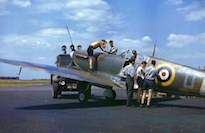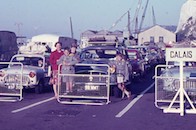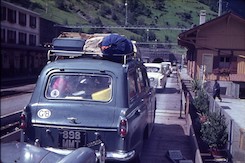 LAC David John Whythe, RAF
LAC David John Whythe, RAF
This is not a photo of Dad beside a Spitfire, but it might
well be. The person standing beside the wing trailing edge,
dressed in long trousers, braces and blue shirt, looks just
like him.On the Spitfire, he described retrofitting them with VHF radio systems, including a fin aerial on the upper fuselage behind the cockpit. To do this, one person had to climb inside the fuselage to align a disc plate underneath it, while someone else held the aerial in position above and drilled down through the holes in the aerial mounting plate. The two would then be clamped together with bolts or rivets.
The first hole, at the front of the mounting plate, would be drilled first, and a bolt inserted to hold it in position while the other holes were drilled. The person inside would align the support plate with the first hole, and then hold it in position while the other holes were drilled. As Dad described events with one of the other teams, the man inside the fuselage made the mistake of agreeing with the man above as to which would be the second hole, defining it as the next one round clockwise - forgetting that clockwise as seen from above would be opposite that as seen from below. And the man inside the fuselage lost the top of his thumb when the drill burst through...
On the Lancaster, Dad described being tasked with fitting one particular aircraft with an internal voice comms system, with new cabling laid in and with a number of plug sockets fitted at particular points within the airframe. This was in preparation for Winston Churchill to fly in the aircraft. He had stated that he wished to be in constant touch with the Pilot, wherever he was inside the aircraft.
Dad told me that he had been reprimanded by the Chief Engineer for not making sure that all the screws he fitted were aligned with the slots vertical. He explained to the Chief Engineer that he had not done so because this would mean either leaving the screws too loose or over-tightened. In response he was told in no uncertain terms that all screw slots MUST be aligned vertically, regardless, and was sent back into the aircraft to correct them all. It was a lesson he never forgot, but also one he never agreed with.
They were assigned a small petrol ration and a vehicle of some sort, together with a small number of German prisoners of war who would assist them with cooking and washing tasks. There were a number of Frenchmen resident on the island, who made a living mainly from fishing. They were struggling to source enough fuel to run their fishing boats, and therefore fishing was difficult, and life for them was hard.
The arrival of the maintenance team on the island was therefore seen by the locals as very positive, because the island was so small that there was little need for their vehicle, and the team were happy to barter their fuel ration for fish. Meanwhile the German prisoners recognised that if they did escape they would be immediately sent to the Russian Front to defend a collapsing Germany, and were therefore not at a major risk of escaping. Dad described life on that island as being a haven of peaceful cooperation, so much so that if the authorities back home knew, they would be likely to be given a reprimand.
 The only contact
I had with any of this came much later, because I was not
born until many years after the war. But Dad had kept his
old canvas kitbag from those years, and we used it as a
convenient bag to hold the frame poles for our family tent.
In the summer of 1963 we had a family holiday camping in
Austria, Switzerland and Germany, accompanied by our older
cousin Alan. Dad's old RAF kitbag, holding the tent frame
poles, was a key piece of luggage on our roof rack.
The only contact
I had with any of this came much later, because I was not
born until many years after the war. But Dad had kept his
old canvas kitbag from those years, and we used it as a
convenient bag to hold the frame poles for our family tent.
In the summer of 1963 we had a family holiday camping in
Austria, Switzerland and Germany, accompanied by our older
cousin Alan. Dad's old RAF kitbag, holding the tent frame
poles, was a key piece of luggage on our roof rack.When we headed home, Dad had booked a place in a campsite near Paris for the last night, so that we would be in a good place to drive from there to Calais on the northern French coast the next morning to catch the ferry home. But when we arrived in the village that evening, there was no sign of the campsite anywhere, and none of the locals we asked for directions could think where it was. So as evening was falling and the light was going, Dad drove up a track to a farm, to ask if they would allow us to camp in one of their fields.
The response we got was very surprising: Despite Dad using his best French with the farmer, the man grabbed a pitchfork and directed him to get back in the car and leave, immediately. Keeping a close eye on the pitchfork, he did. But as he was doing a 3-point turn to head back down the farm track, the farmer flagged him down and indicated to him to open the window. Again, keeping a wary eye on the pitchfork, he did. The farmer then asked him, in broken English, if we were British, and Dad agreed... At which point the farmer's attitude completely changed and he called for us all to get out of the car. Rather puzzled, Dad parked and we all got out...
It seems that, having spent three weeks in German-speaking areas, Dad had picked up a bit of the language, and had spoken French with a German accent. That had triggered memories of the war with the farmer, who had assumed we were German, and that was enough for him to want us off his land. He later told us that a British aircraft had been shot down near the village during the war, and the crew had parachuted out, being hidden from the Germans by the local Resistance, ultimately being smuggled out to safety. He still remembered the way the Germans had tried to find the crew, and had hated them ever since.
 But as Dad was turning the car, the
farmer had seen our GB sticker on the back of the car, and
the kitbag on the roof with "LAC Whythe - RAF" stamped on
it, and realised we could not be German. From that point
onwards he and his family could not do enough for us,
including cutting the grass in the field for the tent and
bringing us fresh milk from his dairy in the morning.
But as Dad was turning the car, the
farmer had seen our GB sticker on the back of the car, and
the kitbag on the roof with "LAC Whythe - RAF" stamped on
it, and realised we could not be German. From that point
onwards he and his family could not do enough for us,
including cutting the grass in the field for the tent and
bringing us fresh milk from his dairy in the morning.This had a huge impact on me, as a 10 year old youngster. It brought home to me how the war had left scars in many peoples' memories, and how deeply some of those feelings ran. I had been brought up without any such bad feelings, and our time camping across Europe had been free of any such worries. It led me, in later life, to be very supportive of any cross-border cooperation throughout Europe, and ultimately I had the chance to vote in support of joining the European Economic Community when I was at University. It means that the Brexit process in recent years has, for me, reopened the wounds that I briefly touched on, and has broken the cooperation that I saw developing across Europe. I wish Europe well as it rebuilds after the trauma of being at war, and I am sad that Britain will not take any further part in that rebuilding of trust and friendship.